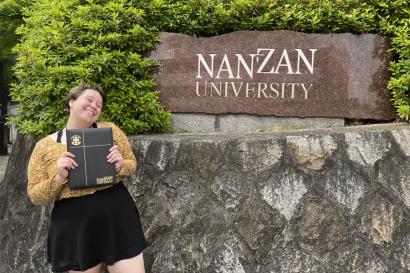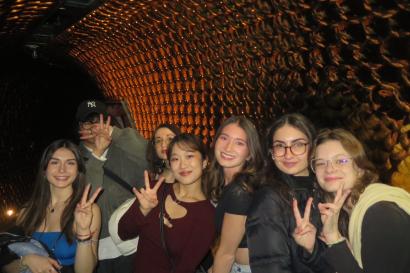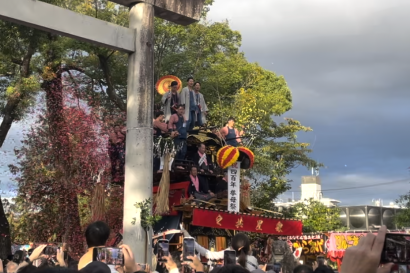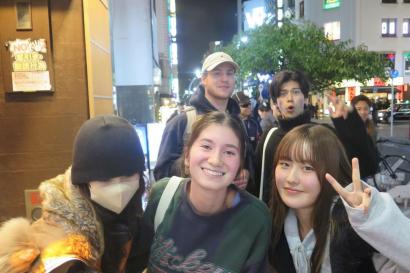As I was writing these blogs, there were so many little things I wanted to blog about, but I felt as if I couldn't write an entire blog about them, so here are some topics that I didn’t touch on in my blogs, but still wanted to discuss! :)
Transportation System: Although it can be really intimidating at first, the transportation system is so easy and convenient once you get used to it! In Tennessee, I hadn’t really used public transport aside from the buses on campus, and I had never used a subway so it was very confusing and I wish I had a little info on it beforehand: so here is some info! One of the main things I wish I had known about before trying to figure it out are IC Cards. Basically, at the stations, you can buy tickets for the subways (at bigger ones, trains/shinkansens), but you can also buy IC Cards, which are very helpful. They usually cost 1000 yen and then they put 500 yen of that on it for you to use. After you buy them, you can put more money on it, and you can use it at the stations as well as other places (conbinis, stores, vending machines, some restaurants, etc). You just tap it and then it takes the money off the card. You can recharge them at the station, and also check your balance there. You can also do this at ATMs in conbinis (I like 7/11 best)! I personally just use the card as is, but I know some people who connected it to their phone. Also, the map itself can be kind of confusing at first, but here’s a breakdown: there are several different lines broken up by color, and you just take those lines until you get to the right stop. If you need to transfer lines, you go to the station where it intersects on the map. To know which platform to use, you can look at the numbers of the platform (this will be shown on the app that you use if you are using them), and you can also see which stations it is bound for on the sign, so you can figure it out that way if you aren’t using an app!
Phone plans: I was a bit confused at first about all the information that IES Abroad gives us: basically, when you get here (like the second day or so), phone providers will come and give all of the information for different plans for data and such. There are a bunch of different options, and you’ll be able to choose which one works best for you. I personally got an international plan instead of doing any of that, and even though it was really expensive I honestly feel like it was worth it. If you are able to go with that option, I totally recommend it! I’m not too sure about which plan is the best out of the ones they offer, but mainly you just pick the one that you feel like would align with your budget the best. They gave us like 3 hours to meet with them and decide what we want—you also don’t have to do it just then, so take your time to decide! It is necessary to get one though just because IES Abroad needs to be able to contact you if it’s an emergency.
Things that happen before classes start: the IES Abroad students arrive earlier than everyone else. When I arrived, we stayed in Inuyama, and stayed there for 4 or 5 days. They paid for our hotel—we each got our own room and it was a very fancy hotel (it had like 8 course meals for dinner). They showed us around a little bit to familiarize us with Japan, especially with the subway system. They also paid for tickets for us to see Inuyama Castle and the surrounding museums. We did a couple of orientations in the hotel as well as signing up for the phone plan as mentioned before, and we got to explore around town by ourselves. We also did 3-hour language classes to prepare us for classes at Nanzan. It was very exhausting, but definitely helpful. After our stay in Inuyama, they paid for our bus ride to campus. Before the beginning of classes, Nanzan held a bunch of orientations and we did a placement exam to be placed in our language class. Then, after that, once we got our results, we were able to sign up for classes. Then after a few days, classes started!
Tips that I’ve gathered from being here:
- Always make sure to keep yen on you—it is not super common for people to use cards here, so I always try to keep at least 3000 yen on me at all times. ATMs are super accessible (you can find them at pretty much any conbini), but it gets kind of frustrating to go back and forth, so definitely plan out conbini trips and such just so you’re never out of yen and end up not being able to buy something.
- I was under the impression that we would have a meal plan, but if you’re in a dorm, you probably won’t have one, so make sure you put enough money in your budget to buy food! The food is typically really cheap here, so that makes it a lot easier, but it can be a bit exhausting at first especially if you’re used to being able to go to a dining hall/have really easy access to cooked food (like me). Also, make sure to take advantage of all of the food on campus! It’s super cheap and really good in my opinion. Since we are provided a kitchen and utensils, I personally wish I had taken some time to learn how to cook a bit more, but I mostly ended up getting food from the conbini everyday lol. So before you come, maybe plan out some easy recipes for yourself and become more familiar with cooking for yourself if you’re not!
- Make sure to take advantage of student discounts (especially for the shinkansen)!
- I have another blog on this, but please make sure to pack lightly. I saw so many things saying to do that, but I didn’t know the full extent of it. But in short: only bring like a week’s worth of clothes and a couple of formal outfits. Unless you really need it, don’t bring it. If you have any doubts that you will actually use it or that you would be able to buy something similar here, don’t bring it. For example, don’t be like me and pack two of your favorite books that you knew you wouldn’t read on the plane and almost have to throw them away because they couldn’t fit in your luggage.
- Bring comfortable shoes and clothes! Obviously it’s great to bring cute fits, especially since there will be so many opportunities for photos, but make sure that you bring comfortable ones as well or you might end up having to buy new ones (which you may not be able to do if you are not the size of an average Japanese person) and then also possibly have to throw away some if they can’t fit in your luggage.
- Don’t be afraid to put yourself out there and make friends. I’ve met so many cool people here, and it has truly made my study abroad experience so much better. Usually people will love to come along and hang out with you as long as you ask. One of my big mottos was that if they didn’t like me or something then I will probably never see them again anyways, and that honestly opened up so many doors for me to make new friends and have new experiences. I’m definitely going to take that line of thinking back with me because I think I closed myself off from so many opportunities just because I was afraid people wouldn’t like me.
- Before coming, I was not at a very high level in terms of my language competency (I’m definitely still not the best, but I’ve improved significantly while being here), and I was really worried about not being able to understand anything that was going on and such. However, I genuinely think it is really easy to catch on, especially if you have a translation app. Some things that I didn’t understand at first that might be good to know/look up before coming: vocabulary for stores/conbinis and such (one of the things I was really confused at first when they were asking if I wanted a bag because they don’t ask you that in the states), restaurant vocabulary, how to ask where things are as well as being able to understand their responses, small talk because locals may wanna talk to you (a lot of people said they didn’t experience this, but I did quite often—I have been told it’s just because I seem approachable (?)), and classroom vocab since the language classes are taught in full Japanese.
- Bring a handkerchief wherever you go—there aren’t any paper towels in the bathroom or any hand dryers (usually), so it’s great to have one to dry off your hands after using the restroom.
- Take as many pictures as you can. I know sometimes it can seem annoying to be seen as a tourist—but the thing is that you are a tourist, and it’s great to have those pictures to look back on whenever it’s through!
- Bring a reusable grocery bag because you have to pay extra for grocery bags (it’s only like 5 yen, but it’s also more environmentally friendly and kind of a social norm to have one)!
- Budget as much as possible—and make sure to take into account all of the kind of traveling you wanna do! I made a google doc and divided the amount I had by how many days were left and made a daily budget based on that as well as making certain amounts for how much I could spend on each trip. Also remember to take into account souvenirs for everyone!
- Although it can be easy to take on so many things because there’s so much to do, make sure to give yourself time to rest because otherwise you will get burned out and it won’t be as fun.
- Take advantage of all of the resources they have on campus, especially for studying. Japan Plaza is great, and the teachers are always there to help, so definitely come to office hours!
- Take as many opportunities as you can to speak Japanese, and don’t be afraid to make mistakes! This is the perfect time to make them and learn as much as possible :)

Macks Koontz
Hello! My name is Macks and I'm a sophomore at the University of Tennessee majoring in Child and Family Studies with a minor in Japanese. I love learning, hiking, reading, and playing the guitar/ukulele. Studying abroad is super important to me and I am so very excited to be able to share my journey with other people :)






